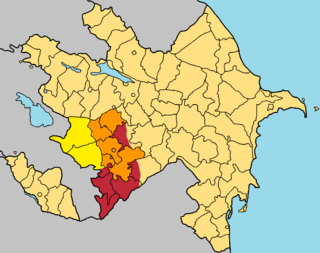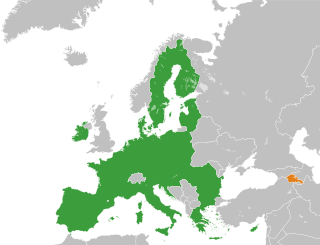Related Research Articles

The Collective Security Treaty Organization (CSTO) is an intergovernmental military alliance in Eurasia consisting of six post-Soviet states: Armenia, Belarus, Kazakhstan, Kyrgyzstan, Russia, and Tajikistan, formed in 2002. The Collective Security Treaty has its origins in the Soviet Armed Forces, which was replaced in 1992 by the United Armed Forces of the Commonwealth of Independent States, and was then itself replaced by the successor armed forces of the respective independent states.

The First Nagorno-Karabakh War was an ethnic and territorial conflict that took place from February 1988 to May 1994, in the enclave of Nagorno-Karabakh in southwestern Azerbaijan, between the majority ethnic Armenians of Nagorno-Karabakh backed by Armenia, and the Republic of Azerbaijan with support from Turkey. As the war progressed, Armenia and Azerbaijan, both former Soviet republics, entangled themselves in protracted, undeclared mountain warfare in the mountainous heights of Karabakh as Azerbaijan attempted to curb the secessionist movement in Nagorno-Karabakh.

The Nagorno-Karabakh conflict was an ethnic and territorial conflict between Armenia and Azerbaijan over the region of Nagorno-Karabakh, inhabited mostly by ethnic Armenians until 2023, and seven surrounding districts, inhabited mostly by Azerbaijanis until their expulsion during the 1990s. The Nagorno-Karabakh region was entirely claimed by and partially controlled by the breakaway Republic of Artsakh, but was recognized internationally as part of Azerbaijan. Azerbaijan gradually re-established control over Nagorno-Karabakh region and the seven surrounding districts.

Serzh Azati Sargsyan is an Armenian politician who served as the third President of Armenia from 2008 to 2018, and twice as the Prime Minister of Armenia from 2007 to 2008 and again from 17 to 23 April 2018, when he was forced to resign in the 2018 Armenian revolution.

The Community for Democracy and Rights of Nations, also commonly and colloquially known as the Commonwealth of Unrecognized States, rarely as CIS-2, is an international organization in Eastern Europe and the South Caucasus of three breakaway states in the territory of the former Soviet Union, all of which have limited to no recognition from the international community.

Relations have always been strong between Azerbaijan and Turkey, the only two predominantly Turkic countries located west of the Caspian Sea. Former Azerbaijani president Heydar Aliyev often described the two as being "one nation, two states."

United Armenia, also known as Greater Armenia or Great Armenia, is an Armenian ethno-nationalist irredentist concept referring to areas within the traditional Armenian homeland—the Armenian Highland—which are currently or have historically been mostly populated by Armenians. The idea of what Armenians see as unification of their historical lands was prevalent throughout the 20th century and has been advocated by individuals, various organizations and institutions, including the nationalist parties Armenian Revolutionary Federation and Heritage, the ASALA and others.

On 17 February 2008, the majority of members of the Assembly of Kosovo, including Hashim Thaçi, and Fatmir Sejdiu, not acting in the capacity of PISG, declared Kosovo an independent and sovereign state. Kosovo was soon recognized as a sovereign state by the United States, Turkey, Albania, Austria, Germany, Italy, France, the United Kingdom, the Republic of China (Taiwan), and others. This triggered an international debate over whether Kosovo's unilateral declaration of independence had set a precedent in international law that could apply to other separatist movements, or whether it is a special case. The recognition of Kosovo's independence by 101 out of 193 UN states, according to many sources, has given fresh impetus to other separatist movements.

The Madrid Principles were proposed peace settlements of the Nagorno-Karabakh conflict, proposed by the OSCE Minsk Group. As of 2020 the OSCE Minsk Group was the only internationally agreed body to mediate the negotiations for the peaceful resolution of the conflict. Senior Armenian and Azerbaijani officials have agreed on some of the proposed principles but have made little or no progress towards the withdrawal of Armenian forces from occupied territories or towards the modalities of the decision on the future Nagorno-Karabakh status.

United Nations General Assembly Resolution 62/243, titled "The Situation in the Occupied Territories of Azerbaijan", is a resolution of the United Nations General Assembly about the situation in Nagorno-Karabakh, which was adopted on March 14, 2008 at the 62nd session of the General Assembly. It became the seventh United Nations document concerning Nagorno-Karabakh and the third and last United Nations General Assembly document on it.
Organisation of the Islamic Conference Resolution 10/11, titled "The aggression of the Republic of Armenia against the Republic of Azerbaijan", is an Organisation of the Islamic Conference Resolution on Nagorno-Karabakh conflict adopted by its member states on March 13–14, 2008 during the OIC summit in Dakar, Senegal.
Organisation of the Islamic Conference of Foreign Ministers Resolution 10/37, titled "The aggression of the Republic of Armenia against the Republic of Azerbaijan", is a set of three Organisation of the Islamic Conference resolutions on Nagorno-Karabakh conflict adopted at the 37th annual session of Foreign Ministers of OIC member states on May 18–20, 2010 held in Dushanbe, Tajikistan. The session was attended by 80 delegations from member states, observer states and international organizations.
The EU Strategy for the South Caucasus is a long term strategy which is directed to create a secure political, economical and social environment next to the eastern borders of the European Union. This is an objective of the European Neighbourhood Policy, and forthcoming Eastern Partnership Program.

Kosovo's declaration of independence from Serbia was enacted on Sunday, 17 February 2008 by a unanimous vote of the Assembly of Kosovo. All 11 representatives of the Serb minority boycotted the proceedings. International reaction was mixed, and the world community continues to be divided on the issue of the international recognition of Kosovo. Armenia's reaction to the 2008 Kosovo declaration of independence has been one of non-recognition, mainly due to concerns about the implications for its own territory claims.

The 2016 Nagorno-Karabakh conflict, also known as the Four-Day War, April War, or April clashes, began along the former Nagorno-Karabakh line of contact on 1 April 2016 with the Artsakh Defence Army, backed by the Armenian Armed Forces, on one side and the Azerbaijani Armed Forces on the other.

Relations between Azerbaijan and the Organization for Security and Cooperation in Europe (OSCE) began when Azerbaijan joined OSCE’s predecessor, the Conference on Security and Cooperation in Europe (CSCE), on January 30, 1992. This was the first European organization Azerbaijan joined. The CSCE transformed into the OSCE shortly afterwards in 1995.
The following is list of the official reactions to the Second Nagorno-Karabakh War.

Armenia and the North Atlantic Treaty Organization have maintained a formal relationship since 1992, when Armenia joined the North Atlantic Cooperation Council. Armenia officially established bilateral relations with NATO in 1994 when it became a member of NATO's Partnership for Peace (PfP) programme. In 2002, Armenia became an Associate Member of the NATO Parliamentary Assembly.

The European Union Monitoring Capacity to Armenia (EUMCAP) was a European Union civilian deployment in the territory of the Republic of Armenia that was agreed on 6 October 2022 and officially became operational on 20 October 2022. The EUMCAP completed its mandate on 19 December 2022 at which point it was superseded by a European Union Planning Assistance Team in Armenia in preparation of a possible longer-term mission in the country.
References
- ↑ "Russia getting into bed with NATO?". The Daily Telegraph . 11 December 2010. Archived from the original on 22 January 2011. Retrieved 11 December 2010.
- 1 2 "NATO statement seen as Azerbaijan's success: analyst". AzerNews. 22 November 2010. Archived from the original on 15 March 2012. Retrieved 11 December 2010.
- ↑ "Vice speaker: Declaration adopted at NATO Lisbon summit strengthens Azerbaijan's position". Trend. 23 November 2010. Archived from the original on 1 July 2022. Retrieved 11 December 2010.
- 1 2 3 "NATO Summit Approves Declaration Denounced By Armenia". KAFKASSAM. Archived from the original on 8 July 2023. Retrieved 11 December 2010.